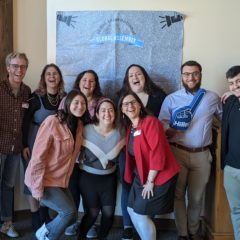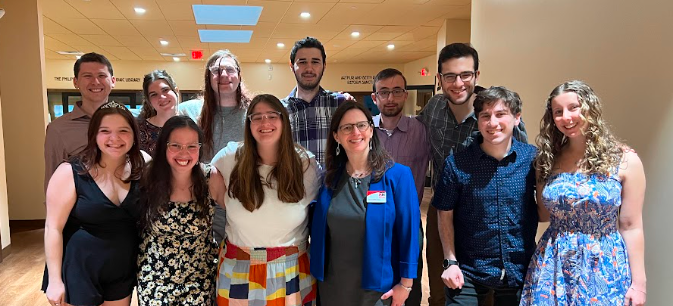Real-life conversation:
Stranger at a Jewish event: “What do you do?”
Me: “I work at the Hillel at Rutgers University, with the largest Jewish undergraduate population in North America.”
Stranger: “Wow, working at a Hillel, you must be battling antisemitism every day!”
Me: “…”
I can pretty much guarantee that NOT A SINGLE Hillel professional went into our work to combat antisemitism. We do the work we do to create sacred moments with students, whether in ritual, counseling, on an immersive experience such as Birthright, laughing together at Shabbat dinner, or chatting over coffee on a weekday. We strive to connect Jewish students with an expression of Jewish life that is most meaningful to them. We want to help Jewish students at a formative time in their lives, to bring them a sense of community, and to educate them about Jewish living. Antisemitism is not the motivating factor in why my colleagues and I go to work every day.
And yet, in the 21 years I have been at Rutgers Hillel, antisemitism on campus has grown. While it existed before, there is something more public and more virulent about the antisemitism we see on campus today. In the 2001-2002 academic year, students at Rutgers were chanting “From the River to the Sea, Palestine will be Free.” Those who know that the “River” is the Jordan and the “Sea” is the Mediterranean understand that this chant is about ridding Jews from the entirety of Israel. Today, we hear about more incidents that pointedly target American Jews and even individual students, such as references to Hitler, blaming Jewish Americans for the actions of the Israeli government solely on the basis of them being Jewish, and telling Jewish students they can’t be part of student government because of their Jewish background.
Unfortunately, this lines up with trends happening in the larger world. The Anti-Defamation League’s 2021 Audit of Antisemitic Incidents cites a 34% increase in antisemitism from the previous year. In the last three years, Jews in America have been attacked with slurs, beatings, and most shockingly, guns and machetes. I don’t remember that happening in 2001-2002 either.
It is important to name that not every Jewish student on every single campus is experiencing antisemitism every day of their college careers. Jewish life on campus is thriving in unprecedented ways, with a variety of support systems in place such as Hillel, Chabad, Jewish Student Unions, and other student organizations. But nonetheless, antisemitic incidents are rising and there is a need for greater efforts toward inclusion of Jewish students on college campuses.
 This year, Rutgers University was part of the Campus Climate Initiative run by Hillel International. It works collaboratively with higher education administrators to ensure a positive campus climate in which Jewish students feel comfortable expressing their identity and values, free of antisemitism, harassment, or marginalization. The CCI model involves partnerships between the college or university administration, the local Hillel, and the CCI team. It is based on the premise that key administrative leaders play an essential role in effecting broad-based educational and policy change on campus, and that the university-Hillel partnership can lead to positive changes that will benefit both Jewish students and all students. CCI’s work is intended to be integrated within universities’ existing commitments to diversity, equity, and inclusion. It has been effective in effecting change within the Rutgers administration this year.
This year, Rutgers University was part of the Campus Climate Initiative run by Hillel International. It works collaboratively with higher education administrators to ensure a positive campus climate in which Jewish students feel comfortable expressing their identity and values, free of antisemitism, harassment, or marginalization. The CCI model involves partnerships between the college or university administration, the local Hillel, and the CCI team. It is based on the premise that key administrative leaders play an essential role in effecting broad-based educational and policy change on campus, and that the university-Hillel partnership can lead to positive changes that will benefit both Jewish students and all students. CCI’s work is intended to be integrated within universities’ existing commitments to diversity, equity, and inclusion. It has been effective in effecting change within the Rutgers administration this year.
In the summer of 2021, the ADL and Hillel International ran a survey of college students and found that 67% of students agreed that their campus was welcoming and supportive of Jewish students. While this is great news, 43% of students witnessed or experienced campus antisemitism in the past year, and 41% of students do not know how to report an antisemitic incident when it occurs. It is incredibly important for students to report incidents. A university can’t respond when no one notifies it of incidents that take place. At Rutgers Hillel, we train our students to report incidents and we offer support when such incidents take place.
Professionals like me who work on campus strive to create a welcoming atmosphere for Jewish students so they can take pride in their identities. Although antisemitism is a fact of life, our efforts are more broadly trying to help students explore their Jewish history, culture, religious expression, and texts. Our bests moments are the moments of pride in being Jewish, celebration, and self-affirmation. Antisemitism can’t take that away from us. And it won’t.

Photos provided by the author.
Get To Know The Author
WGF/DS Alum Esther Reed (Class 9) is the Interim Executive Director at Rutgers University Hillel.

